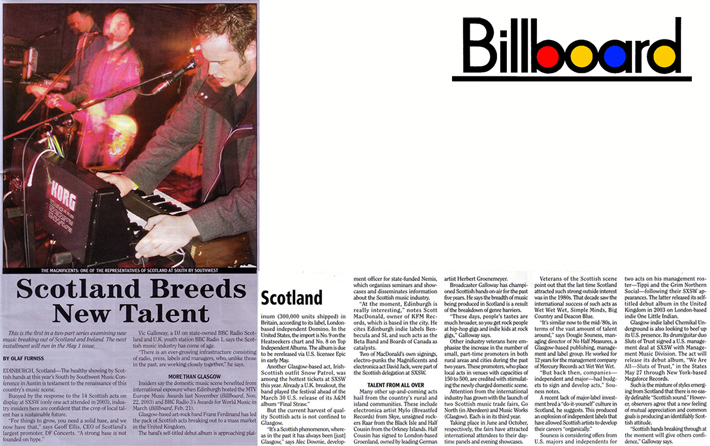
THIS IS THE FIRST IN A TWO-PART SERIES EXAMINING NEW MUSIC BREAKING OUT OF SCOTLAND AND IRELAND. THE NEXT INSTALLMENT WILL RUN IN THE MAY 1 ISSUE.
EDINBURGH, Scotland - The healthy showing by Scottish bands at this year's South By Southwest Music Conference in Austin is testament to the renaissance of this country's music scene.
Buoyed by the response to the 14 Scottish acts on display at SXSW (only one act attended in 2003), industry insiders here are confident that the crop of local talent has a sustainable future.
"For things to grow, you need a solid base, and we now have that," says Geoff Ellis, CEO of Scotland's largest promoter, DF Concerts. "A strong base is not founded on hype."
Vic Galloway, a DJ on state-owned BBC Radio Scotland and UK youth station BBC Radio 1, says the Scottish music industry has come of age.
"There is an ever-growing infrastructure consisting of radio, press, labels and managers, who, unlike those in the past, are working closely together," he says.
MORE THAN GLASGOW
Insiders say the domestic music scene benefited from international exposure when Edinburgh hosted the MTV Europe Music Awards last November (Billboard, Nov. 22, 2003) and BBC Radio 3's Awards For World Music in March (Billboard, Feb. 21).
Glasgow-based art-rock band Franz Ferdinand has led the pack of Scottish acts breaking out to a mass market in the United Kingdom.
The band's self-titled debut album is approaching platinum (300,000 units shipped) in Britain, according to its label, London-based independent Domino. in the United States, the import is No. 9 on the Heatseekers chart at No. 8 on Top Independent Albums. The album is due to be released via U.S. licensee Epic in early May.
Another Glasgow-based act, Irish-Scottish outfit Snow Patrol, was among the hottest tickets at SXSW this year. Already a UK breakout, the band played the festival ahead of the March 30 US release of its A&M album Final Straw.
But the current harvest of quality Scottish acts is not confined to Glasgow.
"It's a Scottish phenomenon, whereas in the past it has just been Glasgow," says Alec Downie, development officer for state-funded Nemis, which organizes seminars and showcases and disseminates information about the Scottish music industry.
At the moment, Edinburgh is really interesting," notes Scott MacDonald, owner of KFM Records, which is based in the city. He cites Edinburgh indie labels Benbecula and SL and such acts as The Beta Band and Boards Of Canada as catalysts.
Two of MacDonald's own signings, electro-punks The Magnificents and electronica act David Jack, were part of the Scottish delegation at SXSW.
TALENT FROM ALL OVER
Many other up-and-coming acts hail from the country's rural and island communities. These include elecronica artist Mylo (Breastfed Records) from Skye, unsigned rockers Raar from the Black Isle and Half Cousin from the Orkney Islands. Half Cousin has signed to London-based Groenland, owned by leading German artist Herbert Groenmeyer.
Broadcaster Galloway has championed Scottish bands on-air for the past five years. He says the breadth of music being produced in Scotland is a result of the breakdown of genre barriers.
"These days, people's tastes are much broader, so you get rock people at hip-hop gigs and indie kids at rock gigs," Galloway says.
Other industry veterans here emphasize the increase in the number of small, part-time promoters in both rural areas and cities during the past two years. These promoters, who place local acts in venues with capacities of 150 to 500, are credited with stimulating the newly charged domestic scene.
Attention from the international industry has grown with the launch of two Scottish music trade fairs, Go North (Aberdeen) and Music Works (Glasgow). Each is in its third year.
Taking plavce in June and October, respectively, the fairs have attracted international attendees to their daytime panels and evening showcases.
Veterans of the Scottish scene point out that the last time Scotland attracted such strong outside interest was in the 1980s. That decade saw the international success of such acts as Wet Wet Wet, Simple Minds, Big Country and Deacon Blue.
"It's similar now to the mid-'80s, in terms of the vast amount of talent around," says Dougie Souness, managing director of No Half Measures, a Glasgow-based publishing, management and label group. He worked for 12 years for the management company of Mercury Records act Wet Wet Wet.
"But back then, companies - independent and major - had budgets to sign and develop acts," Souness notes.
A recent lack of major-label invesment bred a "do-it-yourself" culture in Scotland, he suggests. This produced an explosion of independent labels that have allowed Scottish artists to develop their careers "organically."
Souness is considering offers from US majors and independents for two acts on his management roster - Tippi and the Grim Northern Social - following their SXSW appearances. The latter released its self-titled debut album in the United Kingdom in 2003 on London based indie One Little Indian.
Glasgow indie label Chemikal Underground is also looking to beef up its US presence. Its drum/guitar duo Sluts Of Trust signed a US management deal at SXSW with Management Music Division. The act will release its debut album, We Are All - Sluts Of Trust, in the States May 27 though New York-based Megaforce Records.
Such is the mixture of styles emerging from Scotland that there is no easily definable "Scottish sound." However, observers agree that a new feeling of mutual appreciation and common goals is producing an identifiably Scottish attitude.
"Scottish bands breaking through at the moment will give others confidence," Galloway says.
OLAF FURNISS